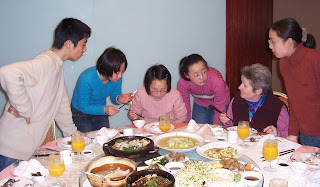In all middle and high school classrooms in China, there
are as many Study Leaders as there are subjects to study. Write the words
English Study Leader on the blackboard and ask for that person to identify
himself or herself.
 |
| Cheng Fei Xiang |
Meet Fly, the English Study Leader in Class 14, Grade One.
His Chinese name is Cheng Fei Xiang and he conducts himself as English Study
Leader with pride.
“Please tell me your duties as English Study Leader”, I
said.
“I help all the other students with their English studies,”
Fly said.
“What things do you do to help them?” I said.
“When we have English study time, I make sure the other
students study well,” he said.
“How do you do that?” I said.
“I help the students write down English words,” he said.
“What else to you do to help the others?” I said.
“I help them say the English words,” Fly said.
Fly’s actions are a living display of a Confucius
philosophy; “It is pointless to learn merely for the sake of learning.
Application must be the end and learning the means.”
The Chinese believe that it is education, which has been
responsible for the ascent of mankind and progress in society.
 |
| Classroom Artwork |
 |
| Frank at Qidong Middle School |
 |
| Susan with Penny, another English Study Leader |
 |
| Susan using fashion as an English topic |






























